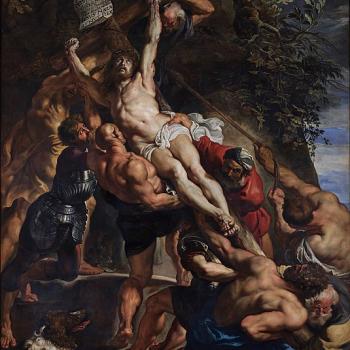The body consists of innumerable cells. Each of these has its own distinct life–its own systems of nutrition, reproduction, and protection–and yet these cells group together to form highly specialized organs that, in turn, make up a single body. The whole scheme, with its incredibly complex relationship of the parts to the whole and the whole to the parts, is astonishing to contemplate. And the makeup of the body is the Bible’s explanation for the Church and for the relationship each Christian has with the others. This is the “Communion of the Saints” that we celebrated yesterday on All Saints Day.We refer to “members” of our churches, just as we speak of “members” of clubs, organizations, and political parties. But “member” originally referred to a part of the body. To say that of someone in the church is to allude to 1 Corinthians 12, which develops the revelation that each Christian is an organ in the body of no less than Christ.
We know much more about physiology than they did in the first century–the interrelationship of highly individualized cells and organs is more true of the body than most of the early readers would have known–but we are so individualistic today in our modern American culture that we probably have even more difficulty in grasping it. But in the Church, we have an individual identity that is part of a larger corporate identity.
We might come to understand that we have a corporate identity in our family, nation, or culture. But this corporate identity, to our further surprise, is that of Christ! We are baptized into Him (12:13), and so we are part of Him, which is how His merit and His work saves us. This also means that we Christians are interconnected with each other. We are part of each other. When one part of the body is hurting, the whole body hurts, and when one part of the body experiences good things, we are all satisfied.
How odd that Christians are often so vicious to each other and so oblivious to each other’s well-being. I guess it’s like our physical bodies struggling with disease–in some of which, as in cancer, AIDS, and lupus, the body turns against itself; in others, outside infections harm or even kill the body’s cells–so that we’ll only know the fullness of both our own bodies and that of the Church, after our Resurrection.
But this is worth contemplating, and the paradigm is worth remembering in our relationships with each other. And that we constitute the body of CHRIST, that speaks to how He works through us and how we manifest Him in the world.
Here is the text from 1 Corinthians 12:
12 For just as the body is one and has many members, and all the members of the body, though many, are one body, so it is with Christ. 13 For in one Spirit we were all baptized into one body—Jews or Greeks, slaves or free—and all were made to drink of one Spirit.
14 For the body does not consist of one member but of many. 15 If the foot should say, “Because I am not a hand, I do not belong to the body,” that would not make it any less a part of the body. 16 And if the ear should say, “Because I am not an eye, I do not belong to the body,” that would not make it any less a part of the body. 17 If the whole body were an eye, where would be the sense of hearing? If the whole body were an ear, where would be the sense of smell? 18 But as it is, God arranged the members in the body, each one of them, as he chose. 19 If all were a single member, where would the body be? 20 As it is, there are many parts, yet one body.
21 The eye cannot say to the hand, “I have no need of you,” nor again the head to the feet, “I have no need of you.” 22 On the contrary, the parts of the body that seem to be weaker are indispensable, 23 and on those parts of the body that we think less honorable we bestow the greater honor, and our unpresentable parts are treated with greater modesty, 24 which our more presentable parts do not require. But God has so composed the body, giving greater honor to the part that lacked it, 25 that there may be no division in the body, but that the members may have the same care for one another. 26 If one member suffers, all suffer together; if one member is honored, all rejoice together.
27 Now you are the body of Christ and individually members of it. 28















